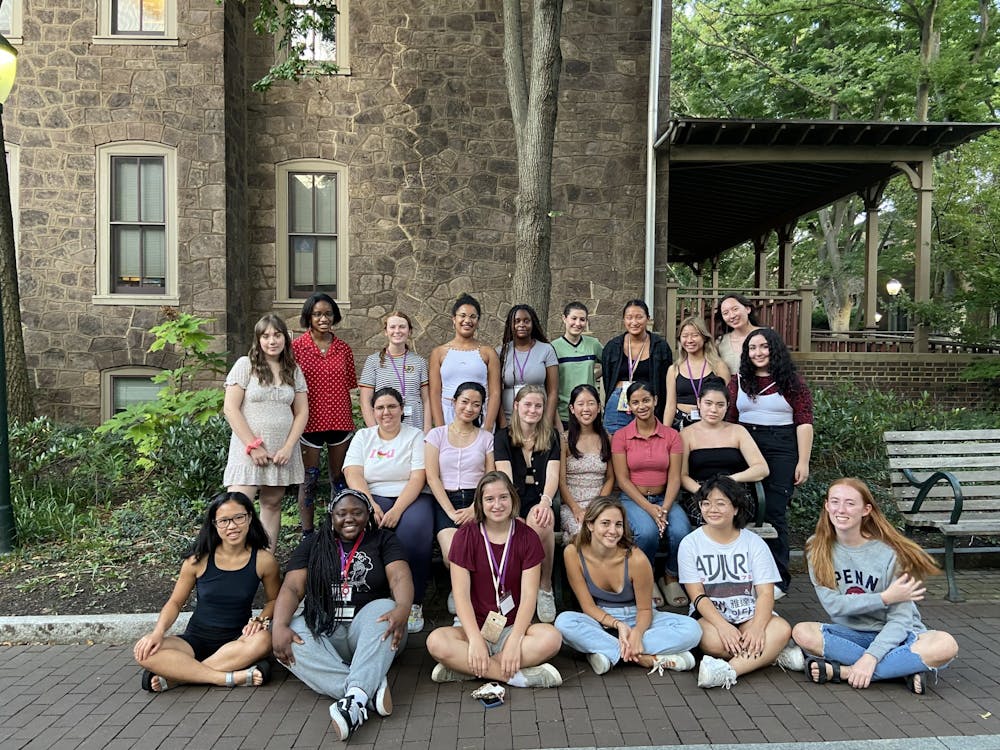Content Warning: Mentions of Sexual Violence on Campuses
Right before the beginning of the semester, Penn hosts several pre–orientation programs aimed at acclimating students to Penn’s campus and organizations before first–year move in. This year, Penn GenEq was a new pre–orientation program that joined the other programs: PennCORP, PENNacle, PennQuest, PennGreen, and PennArts.
Penn GenEq is pioneered by the Penn Association for Gender Equity (PAGE), an organization focused on gender and social justice. The pre–orientation program is centered around building an affinity space for first–year students interested in gender equity work.

Serena Martinez (C '22), First Year Coordinator at PAGE, says that Penn GenEq has been in the works for a long time. They were a freshman in PAGE when discussions of founding GenEq first began. “One of the main reasons that I wanted to run for First Year Coordinator, which is one of the jobs that I have with my co–worker, is because I wanted to try and make Penn GenEq a thing after three years of hoping it would happen. It was definitely a team effort of everyone involved,” says Serena.
According to Serena, affinity groups are imperative for giving marginalized students a space to “flesh out” the topics they may not have been able to talk about in high school. They also highlighted the importance of first–year programs for educating other first years about sexual violence on campuses. “In addition to making space for people to explore their own identities and connecting them to other groups on campus where they can continue to do that, throughout their time at Penn... [The Orientation Program] was also about educating on sexual violence, how to support friends,” says Serena. This is because NSO is what's called a “red zone.” According to Inside Higher Ed, the first six to eight weeks of the semester are the time period when more sexual assaults take place than any other time of the year.
Penn GenEq’s curriculum includes a presentation from PAVE (Penn Anti–Violence Educators) on bystander intervention and a presentation on sexual violence at Penn. In addition to these presentations, GennEq’s curriculum is diverse and varied in its lecture contents. Lectures include Transformative Justice & Pod Mapping by Pablo Cerdera, Who Does Feminism Serve? Identity Politics & Intersectionality, Capitalism & Class, and Trans 101 by PennNonCis.
Penn GenEQ was a phenomenal experience for those who attended, and Street spoke with three first–years who participated in the program.
According to Lex Gilbert (C '25), Penn GenEq was a place where they met their new friend group and got to learn about topics that interested them. “Going into PennGenEq, I did not know how lucky I'd be, but I found my crowd and those people have become my entire friend group. While there, I got to learn about things I had never thought of before, for example, transformative justice, healing, and pod mapping” says Lex.

Lex Gilbert (C'25)/ photo courtesy of Jesse Zhang
Clara Nolan (C '25), another GenEq participant, was drawn toward Penn GenEq because of its focus on social justice. “The fact that GenEq was just starting this year, it was like a pilot, and the whole premise of it was talking about intersectionality issues relating to feminism and gender equity. I thought that would be most aligned with my interests” says Clara.
First–year student Lila DiMasi (C '25) says that Penn GenEq was a nice continuation of her organizing work in high school as the president of her school’s Women’s Empowerment Club. She also said that her favorite part of the experience was the lasting connections she was able to make. “The most valuable part of it was the deep bonding that got to happen with everybody else . . . Every day we were talking about these, like, soul–deep topics” says DiMasi.
Samantha Pancoe (C '22), the chair of PAGE, says that they hope Penn GenEq can exist in perpetuity. “Our goals are to have PennGenEq recognized as a University Life Pre–Orientation Program, ensuring that it is able to run every year, and to welcome our new class of First–Year Fellows in the fall.” Pancoe hopes that PAGE will “keep pushing the boundaries of feminism through programming during Body Reclamation Week, Trans Day of Remembrance, and GenEq Week.”
If you’re interested in beginning your journey into gender equity work, Serena recommends looking at a bunch of classes, clubs, affinity groups, and exploring advocacy and activism on campus.







